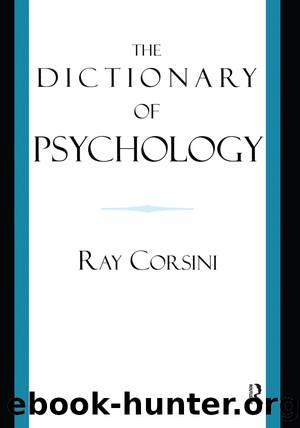The Dictionary of Psychology by Corsini Ray;

Author:Corsini, Ray;
Language: eng
Format: epub
Publisher: Taylor & Francis Group
Maslowâs theory of human motivation A humanistic view proposed by Abraham Maslow, advocating an emphasis on the higher human motives for understanding, esthetic values, self-realization, and peak experiences. Maslow called them abundancy needs, which contrast with the usual emphasis on deficiency needs that stem from physical needs, insecurity, and alienation. The following items are important for understanding Abraham Maslowâs theory: BEING COGNITION, BEING LOVE, DEFICIENCY LOVE, DEFICIENCY MOTIVE, ESTEEM DRIVES, ESTEEM FROM OTHERS, ESTEEM NEEDS, EUPSYCHIA, HOLISTIC INDIVIDUALITY, INSTINCTOID, INSTINCTOID NEEDS, ITERATION, JONAH COMPLEX, LOVE NEEDS, MASLOWâS MOTIVATIONAL HIERARCHY, MASLOWâS THEORY OF HUMAN MOTIVATION, META-MOTIVATION, METANEEDS, METAPATHOLOGY, NEED, PEAK EXPERIENCES, PHYSIOLOGICAL NEEDS, SAFETY NEEDS, SELF-ACTUALIZATION, SELF-ESTEEM, THIRD FORCE IN PSYCHOLOGY.
Masoch See SACHER-MASOCH.
masochism 1. See sexual masochism. 2. Term also applies to experiences that do not involve sex (or in which it may exist in disguised form), such as martyrdom, humiliation, religious flagellation, or asceticism. 3. In psychoanalytic theory, a perverse attitude in that a person expects and wants to be mistreated for many reasons having to do with conscious and unconscious rewards. Named by Richard von Krafft-Ebbing for L. von Sacher-Masoch, who described the behavior in a novel. See PASSIVE ALGOLAGNIA, SACHER-MASOCH.
masochistic character A type of personality that persistently and characteristically obtains gratification or freedom from guilt feelings as a consequence of humiliation, self-derogation, self-sacrifice, wallowing in misery, and submitting to physically painful acts under sexual excitement. See ABASEMENT NEED, MASOCHISM.
masochistic fantasies Daydreams of being whipped, choked, or otherwise abused as an expression of masochistic tendencies, particularly as a means of achieving sexual excitement.
masochistic sabotage Behavior that tends unconsciously to provoke punishment, scorn, or other adverse reactions. In psychoanalytic theory, people who are clumsy or who have repeated accidents may be practicing masochistic sabotage. Self-defeating behavior may also be manifested by a patientâs uncooperative attitude or insulting remarks to the therapist while in therapy.
masochistic wish-dream In sleep, having dreams in which injury is inflicted upon the dreamer.
mass action hypothesis A concept that although the brain has specific sensory- and motor-function centers, the cortex is relatively nonspecific in learning and the general mass of the cortex is involved in cognitive functions. See LAW OF MASS ACTION, LOCALIZATION OF BRAIN FUNCTION.
mass action principle/theory (K. Lashley) A point of view that quantity equals quality in relation to learning; the more neurons involved in the process, the more learning. See LAW OF MASS ACTION.
massage The systematic stroking or kneading of a body area by hand or a mechanical or electrical device, such as a vibrator. Manual massage usually is administered for therapeutic and rehabilitative purposes because the hands can detect abnormalities, such as swellings or muscle spasms. Massage may be performed in a fluid environment, as in a whirlpool bath. Used for relaxation and pain relief.
mass behavior Common conduct of large groups of people who do not have direct communication between them, seen in fads that seem to arise spontaneously, often mentioned in the media after the fad has started, which may extend the fad.
mass contagion/hysteria An epidemic of extreme suggestibility and irrational behavior
Download
This site does not store any files on its server. We only index and link to content provided by other sites. Please contact the content providers to delete copyright contents if any and email us, we'll remove relevant links or contents immediately.
Rewire Your Anxious Brain by Catherine M. Pittman(17600)
Talking to Strangers by Malcolm Gladwell(11909)
The Art of Thinking Clearly by Rolf Dobelli(8868)
Mindhunter: Inside the FBI's Elite Serial Crime Unit by John E. Douglas & Mark Olshaker(7850)
Becoming Supernatural by Dr. Joe Dispenza(7120)
Change Your Questions, Change Your Life by Marilee Adams(6658)
The Road Less Traveled by M. Scott Peck(6649)
Nudge - Improving Decisions about Health, Wealth, and Happiness by Thaler Sunstein(6644)
The Lost Art of Listening by Michael P. Nichols(6485)
Enlightenment Now: The Case for Reason, Science, Humanism, and Progress by Steven Pinker(6414)
Win Bigly by Scott Adams(6328)
Mastermind: How to Think Like Sherlock Holmes by Maria Konnikova(6252)
The Way of Zen by Alan W. Watts(5813)
Daring Greatly by Brene Brown(5652)
Grit by Angela Duckworth(4747)
Big Magic: Creative Living Beyond Fear by Elizabeth Gilbert(4736)
Men In Love by Nancy Friday(4342)
Flow by Mihaly Csikszentmihalyi(4062)
The Four Tendencies by Gretchen Rubin(4030)
